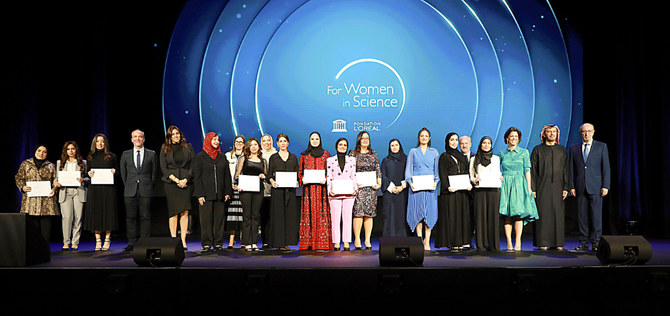L’Oréal-UNESCO celebrates Arab female scientists

To mark the International Day of Women and Girls in Science on Feb. 11, the Fondation L’Oréal and UNESCO hosted the first “For Women in Science Young Talents Awards Ceremony” for MENA. The event took place in the Dubai Exhibition Centre at Expo 2020 Dubai to honor and recognize 14 Arab female scientists from the MENA region for their groundbreaking research in the fields of life and environmental sciences, physical sciences, mathematics and computer sciences. This program is part of the L’Oréal-UNESCO’s global “For Women in Science” initiative that has recognized more than 3,900 phenomenal researchers and 122 laureates from more than 110 countries and regions since its inception in 1998.
The ceremony awarded a total of 14 young talents — five from various countries in the GCC, three from Egypt and six from Levant — in the PhD students and post-doctorate researchers categories, underscoring their role in solving today’s challenges as well as inspiring the future generation of females.
Since its inception in the region in 2010, the L’Oréal-UNESCO For Women in Science Young Talents program has awarded more than 160 female scientists and 11 laureates from MENA. Among them, 16 Arab female scientists have also won an additional international recognition through the “International Rising Talent” program.
The event also welcomed a group of panelists to discuss how Arab women scientists are breaking through barriers and inspiring the next generation of leaders and changemakers. The panelists included Dr. Nawal Al-Hosany, the permanent representative of the UAE to the International Renewable Energy Agency; Dr. Anna Paolini, director of UNESCO office in Doha and representative for the Gulf and Yemen; and Rana El-Chemaitelly, founder and CEO of “The Little Engineer.” The panel was moderated by Alexandra Palt, chief corporate responsibility officer and CEO of the Fondation L’Oréal.
According to the latest UNESCO Science Report published in June 2021, although the number of women in scientific careers is increasing, reaching just over 33 percent of researchers worldwide, this evolution is still too slow.
In the various MENA countries, while gender parity is almost reached at the PhD level or at the start of a scientific career, there are still strong disparities to be observed depending on the countries and the disciplines. The glass ceiling remains a reality in research: The number of female researchers decreases as they access higher levels in their careers due to tremendous obstacles and barriers.
“L’Oréal and UNESCO have been great advocates for the contributions women are making to the STEM sector,” said Sarah bint Yousef Al-Amiri. “The 14 exceptional scientists being honored at this year’s event, the first to be held in our region, are drawn from a wide array of disciplines, from life and environmental sciences to mathematics and computer sciences. This is a reflection of both the breadth of talent in the Middle East and the increasing opportunities for women here to apply it.”
Source: L’Oréal-UNESCO celebrates Arab female scientists (arabnews.com)
